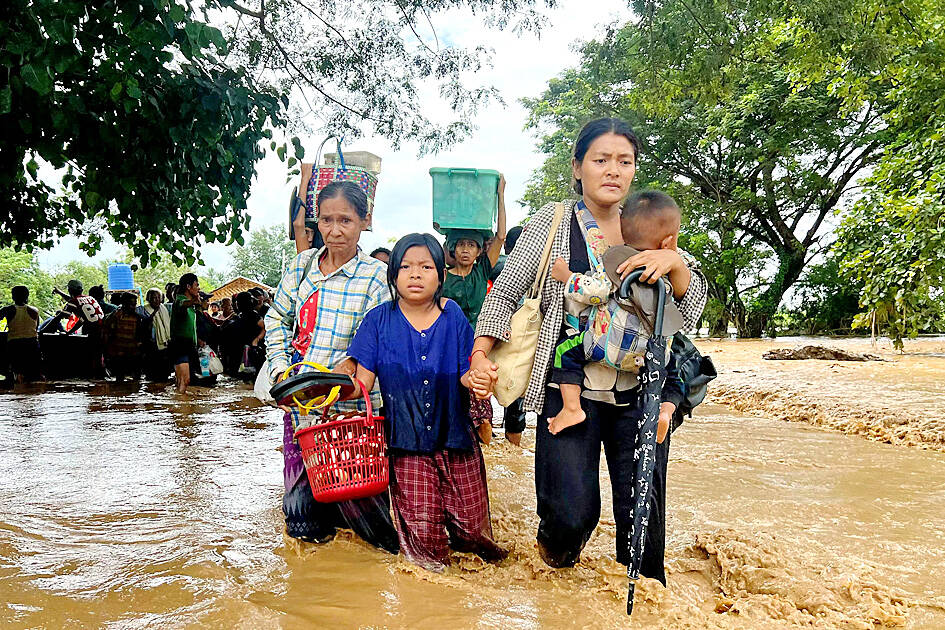Myanmar’s junta chief yesterday made a rare request for foreign aid to cope with deadly floods that have displaced hundreds of thousands of people who have already endured three years of war.
Floods and landslides have killed about 300 people in Myanmar, Vietnam, Laos and Thailand in the wake of Typhoon Yagi, which dumped a colossal deluge of rain when it hit the region last weekend.
In Myanmar, more than 235,000 people have been forced from their homes by floods, the junta said on Friday, piling further misery on the country where war has raged since the military seized power in 2021.

Photo: AFP
In Taungoo — about an hour south of the capital Naypyidaw — residents paddled makeshift rafts on floodwaters that reached the roofs of some buildings.
About 300 people were sheltering at a monastery on high ground in a nearby village.
“We are surrounded by water and we don’t have enough food for everyone,” one man said. “We need food, water and medicine as priority.”
Outside another temple, Buddhist nuns in pink and orange robes waded through knee-deep water.
“I lost my rice, chickens and ducks,” said farmer Naing Tun, who had brought his three cows to higher ground near Taungoo after floodwaters inundated his village.
“I don’t care about the other belongings. Nothing else is more important than the lives of people and animals,” he said.
The rains in the wake of typhoon Yagi sent people across Southeast Asia fleeing by any means necessary, including by elephant in Myanmar and Jet Ski in Thailand.
“Officials from the government need to contact foreign countries to receive rescue and relief aid to be provided to the victims,” the Global New Light of Myanmar newspaper quoted junta chief Min Aung Hlaing as saying.
“It is necessary to manage rescue, relief and rehabilitation measures as quickly as possible,” he was quoted as saying.
Myanmar’s military has previously blocked or frustrated humanitarian assistance from abroad.
Last year, it suspended travel authorizations for aid groups trying to reach about a million victims of powerful Cyclone Mocha that hit the west of the country.
At the time the UN slammed that decision as “unfathomable.”
The junta gave a death toll on Friday of 33, while earlier in the day the country’s fire department said rescuers had recovered 36 bodies.
A military spokesperson said it had lost contact with some areas of the country and was investigating reports that dozens had been buried in landslides in a gold-mining area in central Mandalay region.
Local media reported that six people had been killed in a landslide on Friday in Tachileik.
Separately, Vietnamese authorities yesterday said that 262 people were dead and 83 were missing in the aftermath of Typhoon Yagi.

TRAGEDY STRIKES TAIPEI: The suspect died after falling off a building after he threw smoke grenades into Taipei Main Station and went on a killing spree in Zhongshan A 27-year-old suspect allegedly threw smoke grenades in Taipei Main Station and then proceeded to Zhongshan MRT Station in a random killing spree that resulted in the death of the suspect and two other civilians, and seven injured, including one in critical condition, as of press time last night. The suspect, identified as a man surnamed Chang Wen (張文), allegedly began the attack at Taipei Main Station, the Taipei Fire Department said, adding that it received a report at 5:24pm that smoke grenades had been thrown in the station. One man in his 50s was rushed to hospital after a cardiac arrest

SAFETY FIRST: Double the number of police were deployed at the Taipei Marathon, while other cities released plans to bolster public event safety Authorities across Taiwan have stepped up security measures ahead of Christmas and New Year events, following a knife and smoke bomb attack in Taipei on Friday that left four people dead and 11 injured. In a bid to prevent potential copycat incidents, police deployments have been expanded for large gatherings, transport hubs, and other crowded public spaces, according to official statements from police and city authorities. Taipei Mayor Chiang Wan-an (蔣萬安) said the city has “comprehensively raised security readiness” in crowded areas, increased police deployments with armed officers, and intensified patrols during weekends and nighttime hours. For large-scale events, security checkpoints and explosives

A car bomb killed a senior Russian general in southern Moscow yesterday morning, the latest high-profile army figure to be blown up in a blast that came just hours after Russian and Ukrainian delegates held separate talks in Miami on a plan to end the war. Kyiv has not commented on the incident, but Russian investigators said they were probing whether the blast was “linked” to “Ukrainian special forces.” The attack was similar to other assassinations of generals and pro-war figures that have either been claimed, or are widely believed to have been orchestrated, by Ukraine. Russian Lieutenant General Fanil Sarvarov, 56, head

PUBLIC SAFETY: The premier said that security would be tightened in transport hubs, while President Lai commended the public for their bravery The government is to deploy more police, including rapid response units, in crowded public areas to ensure a swift response to any threats, President William Lai (賴清德) said yesterday after a knife attack killed three people and injured 11 in Taipei the previous day. Lai made the remarks following a briefing by the National Police Agency on the progress of the investigation, saying that the attack underscored the importance of cooperation in public security between the central and local governments. The attack unfolded in the early evening on Friday around Taipei Main Station’s M7 exit and later near the Taipei MRT’s Zhongshan